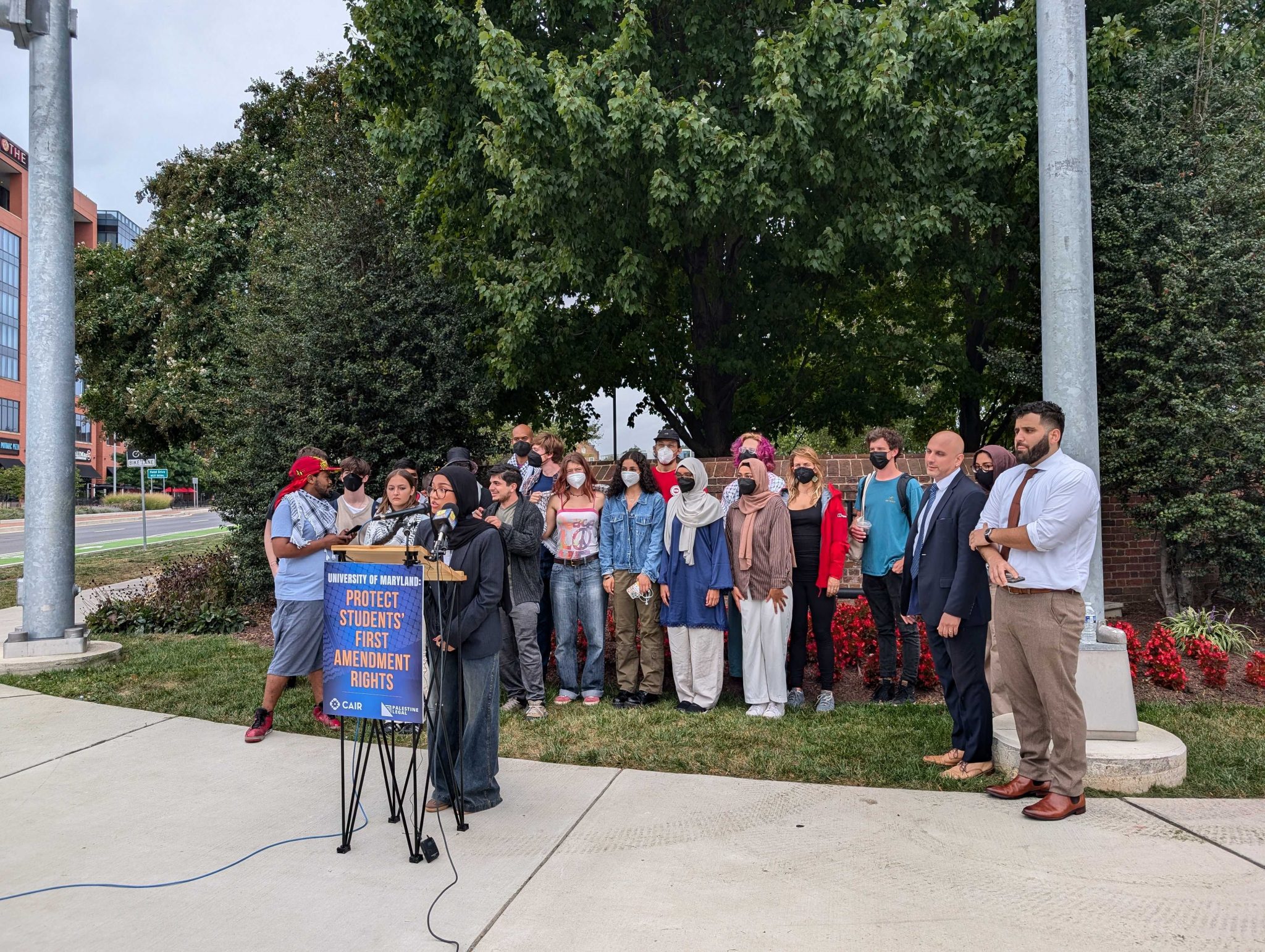The U.S. District Court of Maryland heard arguments on Monday for a lawsuit filed by the University of Maryland’s Students for Justice in Palestine chapter over this university’s plans to limit student group events on Oct. 7.
Judge Peter Messitte oversaw the hearing in Greenbelt for Students for Justice in Palestine’s request for a preliminary injunction, which could pause this university’s limitations on “expressive events” held on Oct. 7.
The hearing comes after the chapter filed a lawsuit on Sept. 17 against this university, university president Darryll Pines and the University System of Maryland Board of Regents in response to the university system’s Oct. 7 event restrictions.
Pines announced in a Sept. 1 campuswide email that the university system and this university would limit all on-campus “expressive events” on Oct. 7 to only university-sponsored events.
Students for Justice in Palestine’s lawsuit alleged the decision violated students’ First Amendment rights and engaged in “unconstitutional content-based discrimination,” according to court documents.
This university’s Students for Justice in Palestine chapter reserved McKeldin Mall in July for a vigil scheduled for Oct. 7 to honor Palestinians killed in Gaza over the past year, according to the lawsuit. The vigil, co-hosted by this university’s Jewish Voice for Peace chapter, would feature an interfaith prayer, Palestinian crafts and teach-ins about Palestinian history, the court documents stated.
Attorneys from the Council for American-Islamic Relations and Palestine Legal are representing Students for Justice in Palestine in the lawsuit.
In his opening statement, Gadeir Abbas, a CAIR senior litigation attorney, said the First Amendment was “being tested” by this university’s “viewpoint-based discrimination.” The emphasis on only Oct. 7 events unfairly targets the chapter’s scheduled vigil, he added.
[ACLU backs Students for Justice in Palestine chapter’s lawsuit against UMD, USM]
“There’s nothing like this anywhere in the country,” Abbas said at a post-hearing press conference. “We are confident that the court will intervene to make sure that [this university] is not the first to establish a free expression blackout day on Oct. 7.”
Daniela Colombi, a Students for Justice in Palestine board member, said during her testimony that the vigil’s importance would be “severely deprecated” if it is forced to take place on another day. The policy is “politically-targeted,” even though the vigil intended for students to reflect and learn, the junior physics and astronomy major added.
Oct. 7 marks one year after Hamas killed at least 1,200 people in Israel and took about 250 people hostage, according to the Associated Press. Since the attack, Israel’s military forces have killed more than 41,000 Palestinians, the Associated Press reported Monday.
After the chapter reserved McKeldin Mall, a letter campaign addressed to administrators at this university and the university system opposed the reservation and cited concerns the event would create a “hostile environment for the Jewish community,” The Diamondback reported in September.
The backlash in response to the scheduled vigil marked a “definable” and “noticeable” change in rhetoric toward this university’s Students for Justice in Palestine chapter, student affairs vice president Patty Perillo said during Monday’s hearing.
In a written statement, or affidavit, submitted to the court Thursday, Perillo said the decision to limit Oct. 7 events stemmed from a series of “more angry, aggressive and violent” messages this university received in August.
An email sent to Pines in August included violent threats toward his children and grandchildren, according to court documents submitted as evidence by this university. Another person called this university on Aug. 30 and claimed she would be “locked and loaded” on campus, Perillo wrote in her affidavit.
This university gave permission for more than 70 Students for Justice in Palestine reservations in the past year, including board meetings, membership meetings, protests and vigils, according to Perillo’s affidavit.
This university has prioritized safety in its decision to ban “expressive events” on Oct. 7, Perillo said during her testimony. In her affidavit, she wrote that all other non-university-sponsored events had their approvals withdrawn, including three sponsored by the Jewish Student Union, which were rescheduled.
Perillo said this university also considered hosting classes virtually on Oct. 7 to ensure community members’ safety.
After conducting multiple safety assessments, University of Maryland Police Chief David Mitchell decided he was not confident in UMPD’s ability to ensure the safety of students, staff and faculty on Oct. 7 without a ban on all “expressive events,” he said during his testimony Monday.
[Students for Justice in Palestine chapter sues UMD, USM for Oct. 7 event restrictions]
The Oct. 7 vigil presented a unique risk compared to past Students for Justice in Palestine events at this university, according to Mitchell.
The university’s restrictions aimed to protect chapter members in addition to Jewish, Muslim and Arab community members, Mitchell told The Diamondback after his testimony.
Chapter members met with university administration multiple times in August about the scheduled vigil, according to court documents. The parties also met on Sept. 1, before Pines’ campuswide email, when university administration informed chapter leaders that approval for the organization’s Oct. 7 event had been revoked, court documents stated.
In response to the university’s decision, the plaintiffs urged this university to provide additional security for the scheduled vigil, rather than revoking the reservation, according to court documents. During the hearing, Abbas alluded to this university’s heightened security in May for Israel Fest and Students for Justice in Palestine’s boycott of the event.
At the post-hearing press conference, Colombi said this university has a responsibility to ensure the safety of Students for Justice in Palestine members in the face of threats from others.
“It is the school’s responsibility to protect us from these people, not by erasing us from the campus,” Colombi said.
A decision on the preliminary injunction is expected by 12 p.m on Tuesday.



